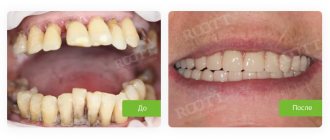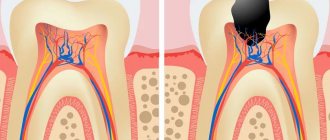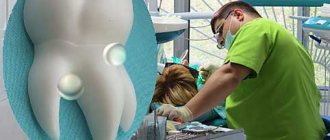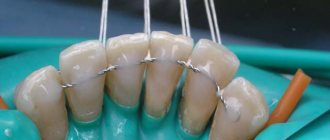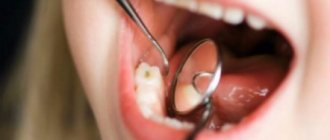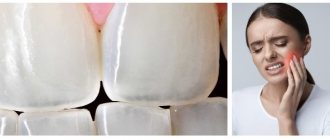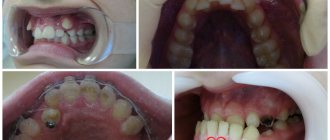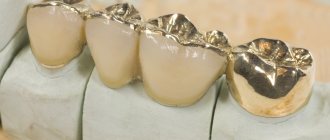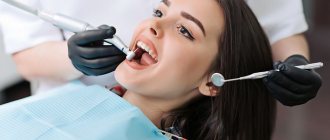Modern solutions offered by clinics allow an individual approach to each patient and selection of the optimal method of restoring teeth in case of their destruction or absence. Prosthetics allows you to restore the aesthetics of the dentition and natural chewing functions, while prolonged absence of teeth always leads to serious health consequences - it affects the bite, jaw joints, and facial appearance. Therefore, it is so important to undergo prosthetics as soon as possible and enjoy the result. But what if instead of “pleasure” you get pain after dental prosthetics?
When is pain after prosthetics normal?
The causes of pain can be different. First of all, we will reassure those who have pain after prosthetics literally on the same day or not the next day that the prosthesis, be it a crown or a bridge, was installed. In 99.9% of cases, this is a normal situation that does not promise anything bad. The anesthesia (if it was used) has stopped working, you are gradually getting used to the new prosthesis, adaptation is required. Discomfort and even a semblance of pain in such conditions is normal. But you still need to carefully monitor your feelings – and consult a specialist if:
- The pain does not go away within 7-10 days
- The pain effect increases
- The pain changes character - from aching it turns into throbbing, it occurs under certain conditions, for example, as a reaction to hot food, or worsens at night when a person takes a horizontal position.
Causes of discomfort after prosthetics
- Error in the choice of design or incorrect installation.
A denture that fits too tightly can cause bedsores. If the structure is not secured correctly, then food can accumulate between the gum and the denture, resulting in inflammation, pain and an unpleasant odor.
- Lack of hygiene. Due to poor oral care and denture care, caries and gum disease can occur.
- Allergy
to prosthetic materials. - Loosening of the prosthesis
due to long use
.
In this case, the chewing load is distributed incorrectly, so discomfort may occur.
Causes of tooth pain under a crown or denture
- If you have not had root canal treatment to remove the pulp before getting a crown, pressure on the damaged nerve may cause pain.
- Patients with malocclusion and bruxism may experience pain at night from pressing on ridges or areas of the tooth that are higher than normal.
- If the denture has shifted, exposing part of the tooth, or, worse, is pressing on the dental nerve, then the slightest pressure or change in temperature can send strong pain signals.
- Teeth under a crown are also at risk for all the problems associated with regular teeth, meaning they can become infected, break, and become vulnerable if the enamel wears down. And this can cause pain.
Teeth hurt after dentures - Caries and its complications
Before starting any prosthetics, the oral cavity must be sanitized. This means that all cavities and other areas of infection must be treated. However, this is not always the case.
Caries can be acute and chronic, initial medium and deep. Medium and deep carious cavities are characterized by pain from thermal irritants. However, initial carious processes can also cause tooth sensitivity, especially localized in the cervical areas. Caries, if left untreated, will lead to even more painful complications - pulpitis, periodontitis or periostitis. In addition, a tooth affected by caries , which is the support of the prosthetic structure, weakens and can break under the chewing load.
Development of pulpitis
Pulpitis is inflammation of the nervous tissue inside the tooth - the pulp. There are acute (partial, general, general purulent) and chronic (simple, hypertrophic, gangrenous). All these types have different symptoms, but each type of pulpitis is characterized by a pronounced pain symptom. The patient complains of constant, intense pain with short light intervals, which is aggravated by thermal and/or mechanical stimuli. If a purulent process develops, it will be pulsating, aggravated by heat, strong and sometimes radiating to neighboring teeth.
Periodontitis is inflammation at the apex of the root, in the bone tissue of the jaw. Types – acute (serous, purulent) and chronic (fibrous, granulating, granulomatous). It is a complication of untreated pulpitis when infection comes out of the root canal into the periapical area. It is characterized by severe pain when biting or percussion, which radiates to adjacent teeth or anatomical formations; pathological mobility is possible when the ligamentous apparatus melts with purulent exudate.
Periostitis is an acute purulent inflammatory process between the bone and the periosteum. Develops as a consequence of untreated processes described above. Accompanied by severe pain, increased body temperature, general malaise, facial asymmetry, and enlarged regional lymph nodes. If adequate assistance is not provided, it can develop into a life- and health-threatening condition - phlegmon.
Periodontitis is a disease of the ligamentous apparatus of the tooth - the periodontium, which often leads to loosening and loss of even apparently healthy teeth. This is a chronic process that, when exacerbated, causes pain and itching in the gums, redness and swelling, tooth mobility, bleeding when brushing, unpleasant odor and suppuration, discomfort while eating and talking.
Denture stomatitis is a lesion of the oral mucosa caused by mechanical or allergic effects of a dental prosthesis, which is accompanied by redness, discomfort, erosion, ulcers and pain. Mechanical damage can be caused by an inconvenient shape of a removable denture or its part (clasp, hook), or an incorrectly manufactured structure - when the edge of the crown extends too deeply into the periodontal sulcus, the flushing part of the bridge fits too tightly to the oral mucosa. An allergic reaction is individual to one or another component of the structure or materials used in the process of its manufacture. Patients experience almost constant pain and burning in the area of the prosthetic bed, glossalgia, and dry mouth. Also, denture stomatitis develops when the rules of oral hygiene are not observed, food debris accumulates under the denture and plaque.
What to do if a tooth hurts under a denture?
If toothache occurs after dentures, the first priority is to identify the cause as soon as possible and apply appropriate therapeutic measures. This problem will not resolve on its own, and any home remedies will not be effective. Therefore, do not wait and contact your dentist for professional help.
If the dentist discovers a tooth infection under the crown, he or she may recommend root canal treatment, which usually requires removal of the denture. In some cases, a hole can be drilled into the crown, allowing the dentist to access the root canal without having to remove and install another crown. This is a complex operation, but it will save you money since the removed crowns are often no longer reusable.
Expert opinion
Roman Borisovich Alekperov
orthopedic dentist
Experience: 24 years
As a rule, an allergic reaction does not always occur immediately after the installation of a crown or prosthesis. It can appear even after several years of use. It happens that when altering old structures with new ones, a reaction such as burning and swelling of the gums occurs. It seems that a person wore metal-ceramic crowns or a prosthesis for many years, got new ones, and six months later severe allergic manifestations began. Of course, to prevent such a development of events, it would be good to check with an allergist before getting prosthetics and take tests for sensitivity to dental materials. And then, new teeth, a new smile will give you pleasure, and not a headache and searching for the cause of poor health all your life. If you have the financial opportunity, it is better to immediately install crowns or prostheses made of zirconium dioxide. Hypoallergenic material. Take care of yourself and be healthy!
Prevention of pain after dental prosthetics
As with all dental procedures, the simplest and cheapest solution is to prevent the problem from occurring in the first place.
- If you have dental crowns or bridges, you should have a dental checkup at least once every 6 months. The dentist will monitor the condition of the teeth under the dentures, since they are initially at risk.
- Hardware cleaning of bacterial plaque and possible food debris will prevent the development of infections and caries; this procedure is mandatory along with normal home oral hygiene, including brushing teeth and using dental floss.
- It is also important to monitor the integrity of the dentures - avoid hard foods and excessive loads so that the denture is not damaged or its tight fit to the stump of the supporting tooth is broken.
Don’t endure pain after dentures - contact the orthopedists at the ILATAN family dentistry closest to your home to get advice and help. Registration is available by phone +7 (495) 748-50-50.
How to identify complications after installation of a prosthesis?
If there are doubts about the normal state of the mucous membrane under the prosthesis, you need to pay attention to several specific manifestations.
Swelling of the gums is a sure sign of the onset of the inflammatory process. The accumulation of purulent exudate under the gum can lead to serious consequences, and in this case you need to contact a dental surgeon. Swelling or gumboil can cause not only pain, but also tooth mobility, and this will lead to the need to replace the denture.
Fistula - acute inflammation of periodontal tissues can result in gumboil. And if the acute period of the complication went unnoticed, then the appearance of a fistula cannot be missed. If the fistula closes, acute inflammation begins again.
Cyst - if adequate treatment of chronic periodontitis was not carried out before prosthetics, it will end with a cyst. The cyst contains pus and appears on an x-ray as a black spot. The symptoms of a cyst are similar to periodontitis - pain when biting, swelling in the area of the causative tooth.
Reasons for the development of complications
- low qualifications of the doctor who incorrectly selects the size of the implant and its location, does not pay much attention to sterility,
- treatment of oral diseases was not carried out, plaque was not removed from remaining teeth,
- the presence of diseases that can lead to implant rejection - at the preparation stage the doctor did not conduct a thorough medical history or the patient hid the presence of body problems,
- exacerbation of a chronic disease,
- injuries of the jaw system,
- smoking and alcohol abuse,
- Poor patient compliance with the implantologist’s recommendations at all stages of treatment, especially ignoring the rules of caring for teeth and gums.
Serious complications that lead to removal of implants are quite rare today. And in order to prevent their occurrence, it is necessary to choose professional and experienced doctors, a reliable clinic and high-quality brands of implants. Patients are also strongly advised to follow the recommendations of the attending physician and in no case ignore the rules of hygienic care.
Is it possible to re-implant teeth?
Complications that led to rejection and subsequent removal of implants are characterized by acute inflammation and shrinkage of bone tissue. Therefore, re-implantation is not always possible. Firstly, a certain time must pass for the rehabilitation of tissues and the entire body. Secondly, re-implantation with delayed loading will require bone grafting - in 99% of cases it will not be enough to re-install the implant.
Another option is to use immediate loading implantation techniques. They do not require bone grafting when installing 3 or more implants, but when performing single restorations, bone grafting may still be required.
As an alternative, removable dentures may be considered after removal of a failed implant. Modern butterfly dentures (immediate dentures) are quite comfortable, they are created in just a few days and can quite effectively solve the problem of missing teeth for some time.
In general, the issue of re-implantation is decided individually for each patient. But the chance remains quite high, especially with promptly taken measures.
1 Perova M.D. Complications of dental implantation, their treatment and prevention. New in dentistry. 2002. 2 F.Renoir., B.Rangert. Risk factors in dental implantology. M., 2004.
Complications of dentures. Galvanic syndrome.
The physical concept of galvanism can also occur in the oral cavity in the form of the syndrome of the same name. This is the formation of a galvanic electric current in the oral cavity in the presence of dissimilar metals in the patient’s mouth, with correspondingly different potentials. In this case, all the conditions necessary for the formation of galvanic current arise. In such situations, saliva performs the function of an electrolyte.
Clinical manifestations are as follows:
- The appearance of a metallic taste in the mouth;
- Darkening of metal parts of prostheses;
- Headache;
- Allergic reactions.
This situation can be resolved by replacing dentures .
Types of complications of dental prosthetics
Prosthetic stomatitis
The most common complications of dentures are:
- Cementation of fixed structures after their fixation;
- Allergic reactions to materials used during prosthetics - most often residual monomer in the base of a removable denture;
- Denture stomatitis is a various pathology of the oral mucosa of an inflammatory nature, caused by the presence of a denture in the oral cavity;
- Caries and its complications under structures;
- Galvanic syndrome is a pathological condition, the appearance of which is caused by the effect of galvanic currents on the tissues of the oral cavity;
- Discomfort caused by the installation of prostheses - rubbing, formation of bedsores under the prosthetic bed.
Dental prosthetics complicated by allergies
Allergic reactions to dental materials are quite common. The main symptoms of this pathology are:
- Redness and swelling of the mucous membrane;
- Inflammation of the salivary glands;
- Dryness and burning in the mouth.
The first signs of an allergic reaction appear within a fairly short time after installation of the prosthesis, most often in the first few hours. In some cases, 2-3 days after completion of prosthetics. If any symptoms are detected, you must consult a doctor with a request to eliminate the pathological process. In some cases, the structure will be made of colorless plastic .
